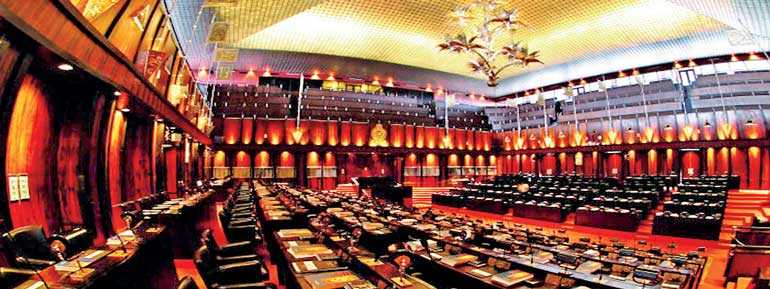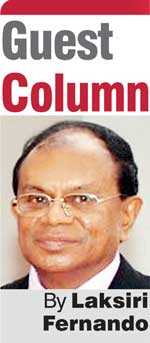Saturday Feb 14, 2026
Saturday Feb 14, 2026
Friday, 1 June 2018 00:00 - - {{hitsCtrl.values.hits}}

 What is categorically defective in the 19th Amendment is that it failed to rationally demarcate the powers between the President and the Prime Minister or Cabinet, or in other words, the State and the Government (the links included). We have this conundrum at present.
What is categorically defective in the 19th Amendment is that it failed to rationally demarcate the powers between the President and the Prime Minister or Cabinet, or in other words, the State and the Government (the links included). We have this conundrum at present.
The 19th Amendment created an ambiguity by retaining the President as the Head of Government while curtailing most of the functional powers. Some of the powers were handed over to the PM, but not fully. The President is responsible for the Government, but has no power to remove the Prime Minister clearly. The President however has many other powers to control or even ‘manipulate’ the ministerial portfolios and their assignments with or without the consent of the PM.
These are the institutional ambiguities that have largely created the inefficiency of the present Government in addition to the policy defects and inadequacies and political party and personality rivalries within the coalition. The coalition has largely disintegrated today.
Too late?
Therefore, if the intention of the 20th Amendment is to correct that ambiguity, it is logical but too late. It is unlikely to receive consensus among main political parties for a major constitutional change towards the end of a parliamentary term. The aborted new Constitution in August 2000 is one example. There are barely 18 months left for the next presidential election. The election preparations have already started.
It is not clear why the JVP or those who realised that there were major defects in the 19th Amendment didn’t attempt to bring forth the 20th Amendment before. There can be a lame excuse that when the 19th Amendment was brought in, the Government didn’t have the required two-thirds majority. But this cannot be said after the elections and after the coalition agreement between the UNP and the SLFP. It can be argued that the President and the SLFP didn’t like further curtailment of powers. But there is no proof. There were no known efforts on the part of the JVP or the constitutional reform advocates to bring a further amendment sooner.
The proposed constitutional change therefore is like trying to close the stable after the horse has bolted. It requires a two-thirds majority in Parliament and then a referendum. Although the JVP is arguing that it might be passed only through parliament without a referendum that cannot be the case. A fundamental change to the constitution which affects the sovereignty of the people in respect of electing the President has to be endorsed by the people. It is wishful thinking to think otherwise.
To prevent GR?
It is also argued that the 20th Amendment is the surest way of preventing a person like Gotabaya Rajapaksa winning the next presidential election and grabbing power to be an all-powerful executive president again. It is true that even after the 19th Amendment, given the ambiguities so far exposed, that a person like GR could grab all power and revert back to the full executive presidential system.
Even on that count it is too late now and in any case that is not the way constitutional reforms should be proposed. Constitutions should not be changed to suit or deprive personalities. This has been one of the curses of constitution-making in Sri Lanka since 1978, including the 19th Amendment. There can be other ways of preventing Rajapaksa coming to power and those have to be political and not constitutional.
It has been proven correct that when the state power and the government power are concentrated in one person or institution that tends to be abused. In developed democracies the state power is highly institutionalised and therefore even under a presidential system, democracy is fairly safe. However, in underdeveloped democracies, when these two powers and institutions combine, abuse and authoritarianism emerge. This is the experience in Sri Lanka in addition to countries like Russia.
JVP proposal?
The key problem of constitutional reform at present fundamentally rests on how to demarcate these two powers - the State and Government. The question of the Head of State is only one aspect.
There is no question that the 20th Amendment apparently has a clear answer to this problem while the 19th Amendment failed to do so. However, the question is whether that is the correct answer. The JVP answer is to completely subordinate the Head of State to the elected Parliament. This was not the case even under the 1972 Constitution. The amendment proposes that after a Parliament is elected, the Members of Parliament elect a President who should not be political. By proposing such, the JVP has shown a peculiar kind of republicanism bordering on anarchism.
Although the appointed person might not be ‘political’ according to the JVP proposal, he or she can be susceptible to political manoeuvres by political parties and politicians. The JVP apparently has a liking for cultivating “independent” personalities close to their policies. Even at the last parliamentary elections, they nominated some independent personalities as national list candidates. This thinking is there in the JVP proposal, although the proposed President is elected by the whole Parliament.
Judging by experience, one could wonder however whether something similar would happen to such an elected President like what happened to Chandrasiri Mayadunne after the last parliamentary elections?
It is true that the present JVP proposal is not completely on those lines, but on the lines of the Indian constitution, particularly after the 42nd Amendment in 1976. The Indian President is the Head of the State, but not the Head of the Executive today. It is like the British Monarch with only symbolic value and functions. But this is only one model. There can be other models or reasoning on how to institutionalise a Head of State and what would be the functions.
Past lessons
As we all know, all present-day states evolved on the basis of past monarchies, continuously or with discontinuities. Unfortunately no state has evolved on the basis of ancient republics which were limited and rare. British monarchy might be the best example for the general evolution. It has evolved finally into a symbolic Head of State.
When America broke away from the British monarchy, it combined the Executive as well as governmental power in the elected President. In other words, it brought about the system we know as the presidential system but with checks and balances. When Ireland broke away from the British monarchy, it opted for parliamentary democracy but elected the President as the Head of State. That is a different model.
In Sri Lanka, when we finally broke away from the British monarchy, we remained as a parliamentary democracy then the Head of State was appointed by the Prime Minister. But this didn’t last for long and we opted for a presidential system, without many checks or balances.
In addition to the lack of checks and balances, the people by and large wanted to nostalgically go back to the Westminster system. But it is not clear whether the people completely want to give up electing their President or not.
Any value to the presidency?
The JVP has argued that almost all parties and leaders have promised the abolition of the presidential system but have always hesitated to do so. Power is the popular explanation for this hesitation. However, it is not only the incumbents and aspirants who have hesitated to totally abolish the system, but there are different views on the subject from different quarters. No one has done a proper public opinion survey. While there are valid criticisms, there is also some liking for the institution.
Therefore, the best consensus would be on a middle path so to say. Why not allow the people to elect their own Head of State? It is more democratic than a President elected by the Parliament. Even in India, the President is not elected by the House of Representatives alone but by an electoral college composed of both houses, upper and lower. It is more democratic than what is now proposed.
An elected President is the only person whom all communities and all sections of society can elect collectively. This is the most tangible national institution that the minorities can influence. Abolition of the popularly-elected president would possibly succumb to majoritarianism.
Of course the elected President should not be the Head of the Government. The President should represent the State and the nation. The Prime Minister and the Cabinet should handle the day-to-day governance or the Government. Nevertheless, there could be some executive functions or responsibilities that an elected President could handle. Those can be limited to:
n National security
n National reconciliation
n Provincial councils
n Anti-corruption
On these matters, the President should be answerable and responsible to Parliament and should coordinate with the Prime Minister and Cabinet. Sri Lanka desperately needs cooperative governance.
Avoiding a reversal
There can be many worthwhile suggestions in the JVP proposal in reducing the excessive powers or unnecessary functions of the President even as the Head of State. No one can figure why, when a Deputy Speaker resigns he or she should inform the President for that resignation to be effective as it was required recently! However, those detail rectifications could be postponed to the future.
If the intention of the proposed 20th Amendment is to prevent a reversal to the oppressive presidential system under an undesirable person elected in 2019, the effort is too late and that is also not the way to go about constitutional reforms. A common democratic candidate might be the best way to prevent such an eventuality.